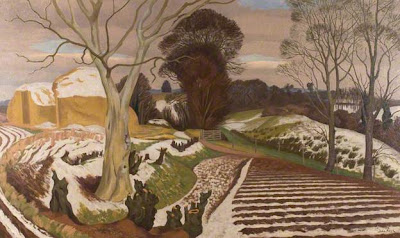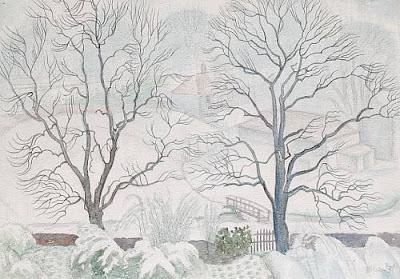There is ever a mystery to all this, isn't there? And our ability to put names to it, to "explain" it -- in the language of Science -- means nothing.
John Aldridge (1905-1983), "February Afternoon"
The Wood
I walked a nut-wood's gloom. And overhead
A pigeon's wing beat on the hidden boughs,
And shrews upon shy tunnelling woke thin
Late winter leaves with trickling sound. Across
My narrow path I saw the carrier ants
Burdened with little pieces of bright straw.
These things I heard and saw, with senses fine
For all the little traffic of the wood,
While everywhere, above me, underfoot,
And haunting every avenue of leaves,
Was mystery, unresting, taciturn.
. . . . .
And haunting the lucidities of life
That are my daily beauty, moves a theme
Beating along my undiscovered mind.
John Drinkwater, Loyalties (1919). The ellipses are in the original.
As long-time readers of this blog know, I tend to be skeptical of the primacy of Science in our modern world, and the claims that are made for it in the name of "progress." (See, for example: Wittgenstein and "Progress"; Edmund Blunden and "Progress"; R. S. Thomas and "Progress.") I should be clear that I am not opposed to the practice of science that leads to cures for diseases, efficient plumbing, and The Wonders of the Internet.
But I am opposed to the utopian belief (which is what it is: a belief -- no different than any sincerely-held religious belief) that Science, by "explaining" all, will ameliorate our ills, improve our lives, and, ultimately, bring us to the gates of Paradise. Alas (for true believers), scientific "explanation" leaves one tiny thing out of account: the human soul -- individual, indissoluble, and inexplicable. As it happens, this tiny omission invalidates the whole utopian project. For which we can all be grateful. Oh, well, back to the drawing board . . .
John Aldridge, "Bridge, February" (1963)
In the Conservatory
A bird's nest lined with leaves and moss
Kept here through the winter . . .
Spring come, I find among leaf-mould
A brown mouse -- the tail an unlikely flourish --
Modelling the letter 'C'
As if it stood for Comfort,
Though it lay there fixed and cold.
Clive Wilmer, The Times Literary Supplement (December 8, 2006).
John Aldridge, "Beslyn's Pond, Great Bardfield"




















